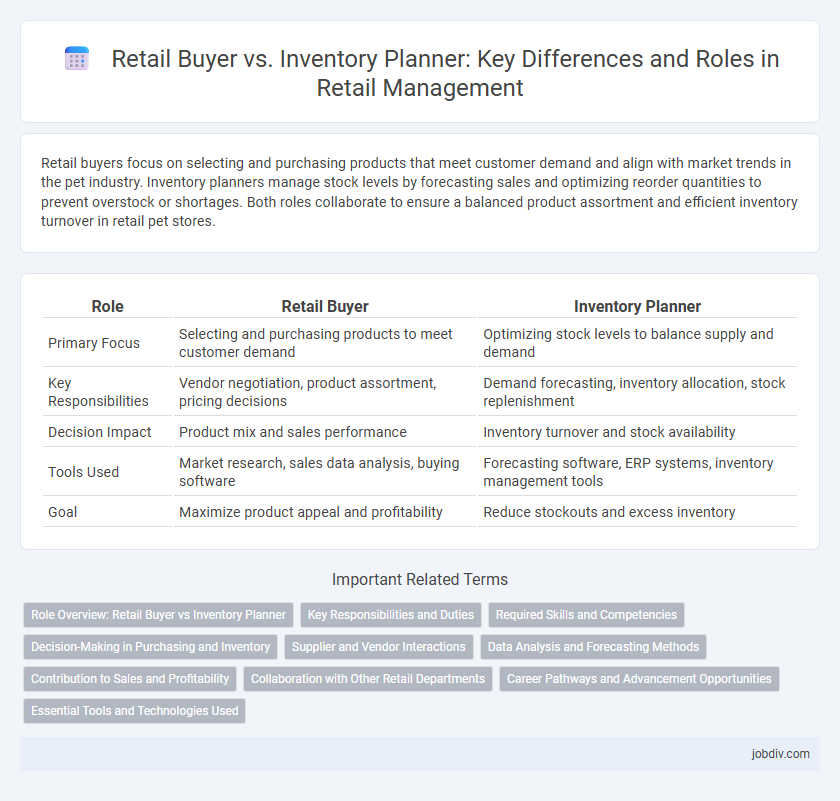Retail buyers focus on selecting and purchasing products that meet customer demand and align with market trends in the pet industry. Inventory planners manage stock levels by forecasting sales and optimizing reorder quantities to prevent overstock or shortages. Both roles collaborate to ensure a balanced product assortment and efficient inventory turnover in retail pet stores.
Table of Comparison
| Role | Retail Buyer | Inventory Planner |
|---|---|---|
| Primary Focus | Selecting and purchasing products to meet customer demand | Optimizing stock levels to balance supply and demand |
| Key Responsibilities | Vendor negotiation, product assortment, pricing decisions | Demand forecasting, inventory allocation, stock replenishment |
| Decision Impact | Product mix and sales performance | Inventory turnover and stock availability |
| Tools Used | Market research, sales data analysis, buying software | Forecasting software, ERP systems, inventory management tools |
| Goal | Maximize product appeal and profitability | Reduce stockouts and excess inventory |
Role Overview: Retail Buyer vs Inventory Planner
A Retail Buyer is responsible for selecting and purchasing merchandise based on market trends, consumer demand, and sales performance to maximize profitability and align with the retailer's brand strategy. An Inventory Planner focuses on forecasting inventory requirements, managing stock levels, and coordinating replenishments to ensure optimal product availability while minimizing excess inventory costs. Both roles collaborate closely to balance product assortment, supply chain efficiency, and financial goals within the retail environment.
Key Responsibilities and Duties
A Retail Buyer focuses on selecting and purchasing merchandise based on market trends, customer preferences, and sales data to ensure product availability and profitability. Inventory Planners analyze stock levels, sales forecasts, and supply chain logistics to optimize inventory turnover and minimize stockouts or excess inventory. Both roles require collaboration with suppliers and internal teams to align product assortment with demand and financial objectives.
Required Skills and Competencies
A Retail Buyer excels in market analysis, negotiation, and trend forecasting to select and procure merchandise that aligns with consumer demand and company profitability goals. An Inventory Planner specializes in demand forecasting, inventory optimization, and data-driven decision-making to balance stock levels, reduce carrying costs, and prevent stockouts. Both roles require strong analytical abilities, proficiency in inventory management software, and effective communication skills to collaborate with suppliers and internal teams.
Decision-Making in Purchasing and Inventory
Retail buyers make strategic purchasing decisions based on market trends, customer demand, and supplier negotiations to select products that maximize sales and profit margins. Inventory planners focus on optimizing stock levels by analyzing sales forecasts, lead times, and warehouse capacity to ensure product availability while minimizing overstock and stockouts. Both roles collaborate closely to balance product assortment and inventory efficiency, driving overall supply chain performance in retail operations.
Supplier and Vendor Interactions
Retail buyers primarily focus on selecting and negotiating with suppliers to procure products that align with market demand and brand strategy, ensuring optimal pricing and exclusive vendor relationships. Inventory planners analyze sales trends and stock levels to communicate precise replenishment needs with vendors, minimizing overstock and stockouts by coordinating delivery schedules. Both roles require effective supplier and vendor interactions but differ in that buyers drive product assortment decisions while planners optimize inventory flow and availability.
Data Analysis and Forecasting Methods
Retail buyers utilize data analysis to identify trends, customer preferences, and product performance, relying on sales data and market research to make purchasing decisions. Inventory planners focus on forecasting methods such as demand planning, historical sales data analysis, and statistical models to optimize stock levels and prevent overstock or stockouts. Both roles leverage predictive analytics and real-time data to enhance supply chain efficiency and maximize profitability in retail operations.
Contribution to Sales and Profitability
Retail buyers drive sales and profitability by selecting merchandise that aligns with consumer demand and market trends, directly influencing product assortment and pricing strategies. Inventory planners optimize stock levels and turnover rates, minimizing holding costs and reducing stockouts to enhance profit margins. Both roles collaborate to balance product availability with cost efficiency, maximizing overall retail performance.
Collaboration with Other Retail Departments
Retail buyers collaborate closely with merchandising, marketing, and sales teams to align product selection with consumer demand and promotional strategies. Inventory planners work alongside supply chain, warehouse, and logistics departments to ensure stock levels match forecasted sales and seasonal trends. Effective collaboration between retail buyers and inventory planners minimizes stockouts and overstocks, optimizing inventory turnover and profitability.
Career Pathways and Advancement Opportunities
Retail buyers specialize in selecting and purchasing merchandise, leveraging market analysis and vendor relationships to drive sales, with career advancement often leading to senior buyer or category manager roles. Inventory planners focus on demand forecasting and stock replenishment to optimize inventory turnover and reduce costs, progressing toward inventory control manager or supply chain director positions. Both career pathways offer opportunities for cross-functional leadership roles within merchandise planning and retail operations.
Essential Tools and Technologies Used
Retail buyers rely heavily on advanced analytics software and supplier management platforms to forecast demand, negotiate contracts, and select merchandise that aligns with market trends. Inventory planners utilize inventory management systems, demand forecasting tools, and automated replenishment software to optimize stock levels, reduce holding costs, and prevent stockouts. Both roles benefit from integrating POS data and ERP systems to enhance decision-making accuracy and operational efficiency.
Retail Buyer vs Inventory Planner Infographic

 jobdiv.com
jobdiv.com